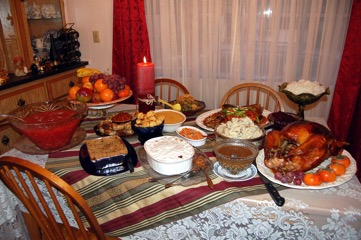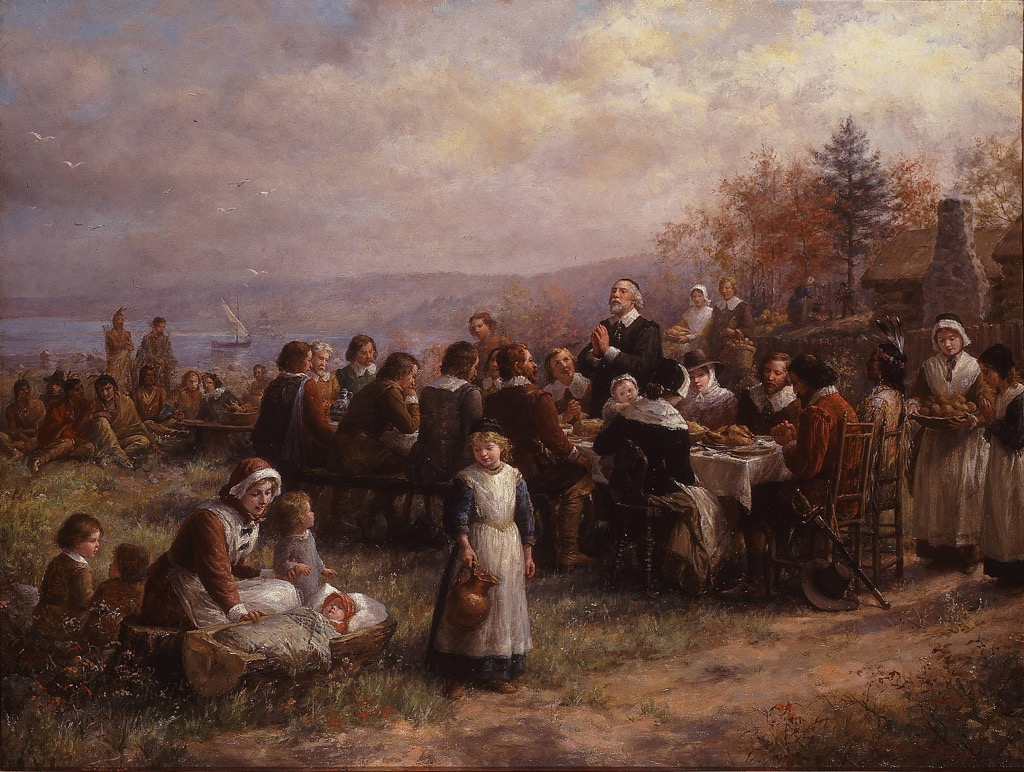Thanksgiving 2023
November/19/2023

History
Prayers of thanks and special thanksgiving ceremonies are common among most religions after harvests and at other times of the year. The Thanksgiving holiday's history in North America is rooted in English traditions dating from the Protestant Reformation. It also has aspects of a harvest festival, even though the harvest in New England occurs well before the late-November date on which the modern Thanksgiving holiday is celebrated.
In the English tradition, days of thanksgiving and special thanksgiving religious services became important during the English Reformation in the reign of Henry VIII. Before 1536 there were 95 Church holidays, plus 52 Sundays, when people were required to attend church and forego work. Though the 1536 reforms in the Church of England reduced the number of holidays in the liturgical calendar to 27, the Puritan party in the Anglican Church wished to eliminate all Church holidays apart from the weekly Lord's Day, including the evangelical feasts of Christmas and Easter (cf. Puritan Sabbatarianism). The holidays were to be replaced by specially called Days of Fasting and Days of Thanksgiving, in response to events that the Puritans viewed as acts of special providence. Unexpected disasters or threats of judgement from on high called for Days of Fasting.
Special blessings, viewed as coming from God, called for Days of Thanksgiving, which were observed through Christian church services and other gatherings. For example, Days of thanksgiving were called following the victory over the Spanish Armada in 1588 and following the deliverance of Queen Anne in 1605. An unusual annual Day of Thanksgiving began in 1606 following the failure of the Gunpowder Plot in 1605 and developed into Guy Fawkes Day on November 5. Days of Fasting were called on account of plagues in 1604 and 1622, drought in 1611, and floods in 1613. Annual Thanksgiving prayers were dictated by the charter of English settlers upon their safe landing in America in 1619 at Berkeley Hundred in Virginia.
 An annual thanksgiving holiday tradition in North American colonies is documented for the first time in 1619, in what is now called the Commonwealth of Virginia. Thirty-eight English settlers aboard the ship Margaret arrived by way of the James River at Berkeley Hundred in Charles City County, Virginia on December 4, 1619. The landing was immediately followed by a religious celebration, specifically dictated by the group's charter from the London Company. The charter declared, "that the day of our ships arrival at the place assigned for plantation in the land of Virginia shall be yearly and perpetually kept holy as a day of thanksgiving to Almighty God." Since the mid 20th century, the original celebration has been commemorated there annually at present-day Berkeley Plantation, ancestral home of the Harrison family of Virginia.
An annual thanksgiving holiday tradition in North American colonies is documented for the first time in 1619, in what is now called the Commonwealth of Virginia. Thirty-eight English settlers aboard the ship Margaret arrived by way of the James River at Berkeley Hundred in Charles City County, Virginia on December 4, 1619. The landing was immediately followed by a religious celebration, specifically dictated by the group's charter from the London Company. The charter declared, "that the day of our ships arrival at the place assigned for plantation in the land of Virginia shall be yearly and perpetually kept holy as a day of thanksgiving to Almighty God." Since the mid 20th century, the original celebration has been commemorated there annually at present-day Berkeley Plantation, ancestral home of the Harrison family of Virginia.
The more familiar Thanksgiving precedent accompanied by feasting is traced to the Pilgrims and Puritans who emigrated from England in the 1620s and 1630s. They brought their previous tradition of Days of Fasting and Days of Thanksgiving with them to New England. The 1621 Plymouth, Massachusetts thanksgiving was prompted by a good harvest. The Pilgrims celebrated this with the Wampanoags, a tribe of Native Americans who, along with the last surviving Patuxet, had helped them get through the previous winter by giving them food in that time of scarcity, in exchange for an alliance and protection against the rival Narragansett tribe.
Several days of Thanksgiving were held in early New England history that have been identified as the "First Thanksgiving", including Pilgrim holidays in Plymouth in 1621 and 1623, and a Puritan holiday in Boston in 1631. According to historian Jeremy Bangs, director of the Leiden American Pilgrim Museum, the Pilgrims may have been influenced by watching the annual services of Thanksgiving for the relief of the siege of Leiden in 1574, while they were staying in Leiden. Now called 3 Oktoberfeest, Leiden's autumn thanksgiving celebration in 1617 was the occasion for sectarian disturbance that appears to have accelerated the pilgrims' plans to emigrate to America.
Later in New England, religious thanksgiving services were declared by civil leaders such as Governor Bradford, who planned the Plymouth colony's thanksgiving celebration and feast in 1623. Bradford issued a proclamation of Thanksgiving following victory in the Pequot War in the late 1630s to celebrate "the bloody victory, thanking God that the battle had been won." The practice of holding an annual thanksgiving harvest festival did not become a regular affair in New England until the late 1660s.
Thanksgiving proclamations were made mostly by church leaders in New England up until 1682, and then by both state and church leaders until after the American Revolution. During the revolutionary period, political influences affected the issuance of Thanksgiving proclamations. Various proclamations were made by royal governors, and conversely by patriot leaders, such as John Hancock, General George Washington, and the Continental Congress, each giving thanks to God for events favorable to their causes. As President of the United States, George Washington proclaimed the first nationwide thanksgiving celebration in America marking November 26, 1789, "as a day of public thanksgiving and prayer, to be observed by acknowledging with grateful hearts the many and signal favours of Almighty God", and calling on Americans to "unite in most humbly offering our prayers and supplications to the great Lord and Ruler of Nations and beseech him to pardon our national and other transgressions
Prayers of thanks and special thanksgiving ceremonies are common among most religions after harvests and at other times of the year. The Thanksgiving holiday's history in North America is rooted in English traditions dating from the Protestant Reformation. It also has aspects of a harvest festival, even though the harvest in New England occurs well before the late-November date on which the modern Thanksgiving holiday is celebrated.
In the English tradition, days of thanksgiving and special thanksgiving religious services became important during the English Reformation in the reign of Henry VIII. Before 1536 there were 95 Church holidays, plus 52 Sundays, when people were required to attend church and forego work. Though the 1536 reforms in the Church of England reduced the number of holidays in the liturgical calendar to 27, the Puritan party in the Anglican Church wished to eliminate all Church holidays apart from the weekly Lord's Day, including the evangelical feasts of Christmas and Easter (cf. Puritan Sabbatarianism). The holidays were to be replaced by specially called Days of Fasting and Days of Thanksgiving, in response to events that the Puritans viewed as acts of special providence. Unexpected disasters or threats of judgement from on high called for Days of Fasting.
Special blessings, viewed as coming from God, called for Days of Thanksgiving, which were observed through Christian church services and other gatherings. For example, Days of thanksgiving were called following the victory over the Spanish Armada in 1588 and following the deliverance of Queen Anne in 1605. An unusual annual Day of Thanksgiving began in 1606 following the failure of the Gunpowder Plot in 1605 and developed into Guy Fawkes Day on November 5. Days of Fasting were called on account of plagues in 1604 and 1622, drought in 1611, and floods in 1613. Annual Thanksgiving prayers were dictated by the charter of English settlers upon their safe landing in America in 1619 at Berkeley Hundred in Virginia.

The more familiar Thanksgiving precedent accompanied by feasting is traced to the Pilgrims and Puritans who emigrated from England in the 1620s and 1630s. They brought their previous tradition of Days of Fasting and Days of Thanksgiving with them to New England. The 1621 Plymouth, Massachusetts thanksgiving was prompted by a good harvest. The Pilgrims celebrated this with the Wampanoags, a tribe of Native Americans who, along with the last surviving Patuxet, had helped them get through the previous winter by giving them food in that time of scarcity, in exchange for an alliance and protection against the rival Narragansett tribe.
Several days of Thanksgiving were held in early New England history that have been identified as the "First Thanksgiving", including Pilgrim holidays in Plymouth in 1621 and 1623, and a Puritan holiday in Boston in 1631. According to historian Jeremy Bangs, director of the Leiden American Pilgrim Museum, the Pilgrims may have been influenced by watching the annual services of Thanksgiving for the relief of the siege of Leiden in 1574, while they were staying in Leiden. Now called 3 Oktoberfeest, Leiden's autumn thanksgiving celebration in 1617 was the occasion for sectarian disturbance that appears to have accelerated the pilgrims' plans to emigrate to America.
Later in New England, religious thanksgiving services were declared by civil leaders such as Governor Bradford, who planned the Plymouth colony's thanksgiving celebration and feast in 1623. Bradford issued a proclamation of Thanksgiving following victory in the Pequot War in the late 1630s to celebrate "the bloody victory, thanking God that the battle had been won." The practice of holding an annual thanksgiving harvest festival did not become a regular affair in New England until the late 1660s.
Thanksgiving proclamations were made mostly by church leaders in New England up until 1682, and then by both state and church leaders until after the American Revolution. During the revolutionary period, political influences affected the issuance of Thanksgiving proclamations. Various proclamations were made by royal governors, and conversely by patriot leaders, such as John Hancock, General George Washington, and the Continental Congress, each giving thanks to God for events favorable to their causes. As President of the United States, George Washington proclaimed the first nationwide thanksgiving celebration in America marking November 26, 1789, "as a day of public thanksgiving and prayer, to be observed by acknowledging with grateful hearts the many and signal favours of Almighty God", and calling on Americans to "unite in most humbly offering our prayers and supplications to the great Lord and Ruler of Nations and beseech him to pardon our national and other transgressions
